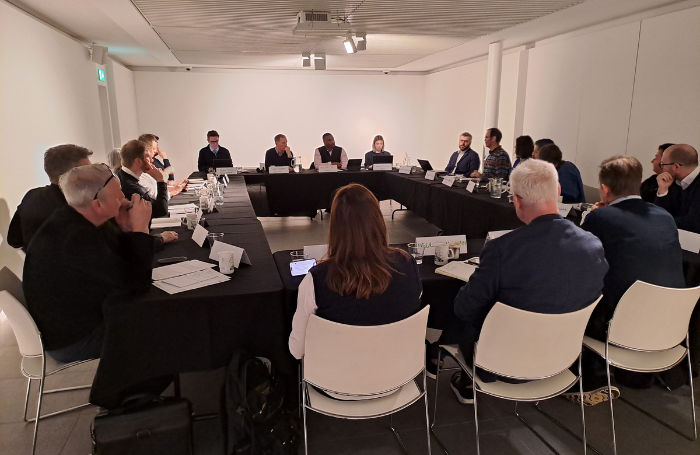Last week, 20 RIBA Members gathered at RIBA North on the Liverpool waterfront to share their insights with Sir Chris Bryant MP, Shadow Minister for Creative Industries and Digital. The main topic of discussion was what a future government should do to help grow the creative industries, specifically the architecture sector.
Chaired by RIBA President, Muyiwa Oki, the discussion focused on improving the sustainability of the built environment, speeding up the planning process and ensuring the sector has access to diverse talent.
Sir Chris Bryant MP said:
“It was a pleasure to join representatives from across the architecture sector to hear more about the challenges and opportunities of this wonderfully successful creative industry here in the UK.
“Architecture in Britain has always played a huge part in our economic and cultural life, from our much-admired heritage buildings to our homes and high streets. We need architecture to thrive in the UK if we are going to spur investment and revive our economy.
“I look forward to working together with the sector to navigate tackling carbon emissions, supporting new talent and skills and most importantly – to get Britain building again.”
Addressing the climate emergency
The discussion began with a sobering reality check: the built environment is responsible for 37% of global energy-related carbon emissions, and with 80% of current buildings still in use in 2050, urgent action is needed to reach net zero.
For new buildings, this means strict whole life carbon targets, covering both operational energy and embodied carbon. Thinking about the changing climate, we also need to design buildings that are resilient to flooding and overheating.
Learning from global best practices, including leveraging insights from initiatives such as our work with the Commonwealth Association of Architects (CAA) is vital in understanding how other countries are dealing with, and adapting to climate change.
We discussed the urgent need for a National Retrofit Strategy, a long term plan and investment programme, to upgrade the energy efficiency of our housing stock through addressing incentives and creating jobs.
Navigating planning challenges
Challenges in the planning system are stifling development. RIBA’s Future Trends research has highlighted alarming statistics: a significant uptick in project abandonments and delays. The key to remedying this is the urgent need for comprehensive resourcing of planning authorities.
Recruiting and retaining highly qualified planners and design professionals, including architects, is essential for facilitating high quality developments that cater to community needs. The simplification of the planning system, including increasing community engagement, is also essential to drive sustainable development.

Ensuring access to talent and skills
British architecture is a global success story. Architects come from around the world to practice and study here because British practices and universities have a reputation for excellence and innovation. However, to further enhance the profession's reputation for excellence and innovation, we need a diverse pipeline of talent.
A key issue here is the financial barriers associated with architectural education. To broaden access to the profession, we need shorter routes to the register and scale up the use of apprenticeships. The impact of external factors such as Brexit and the COVID-19 pandemic on talent retention and recruitment were discussed, and how a functioning immigration system is vital for the UK architecture sector to grow.
The role that education can play in driving change was also discussed. Suggestions included integrating sustainable construction principles into educational curricula and promoting place-based sustainability initiatives to help young people become interested in the built environment and enter the profession.
What’s next?
RIBA’s Policy and Public Affairs team continue to work with members and MPs from across the political spectrum. Together we have the power to shape a built environment that not only meets the needs of today but also safeguards the future of generations to come.
Find out more about what we are calling on the next government to achieve with our manifesto for a better built environment.
About RIBA Policy
RIBA's Policy and Public Affairs team lobbies the UK government and Parliament to champion architects, for better buildings, stronger communities, and higher environmental standards.
We provide thought leadership through the development of policy and research, using the expertise of our members.
We’re working closely with the government to represent the needs of our members, as we respond to the climate emergency and ensure all buildings contribute to the health and happiness of those who live and use them. You can find out more about our work below.









